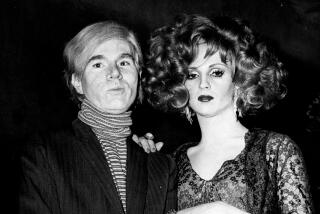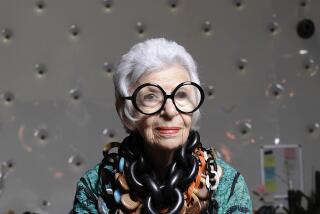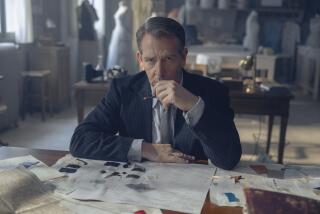A tough but elegant turn as fledgling Coco Chanel
During World War II, trend-setting French designer Coco Chanel, who extolled the virtues of simplicity -- albeit very expensive simplicity -- had a love affair with a German officer. She was once arrested on war crime charges but was set free through the intervention of the British royal family.
But don’t look for that controversial chapter of her life in the new French film “Coco Before Chanel,” which opens Friday. The lavish two-hour biopic concentrates on her life before she became famous.
“I didn’t want to go into the 1930s and ‘40s,” says writer-director Anne Fontaine (“The Girl From Monaco”). “I wanted to be free. I didn’t want to be controlled by any Chanel house. I could do the script the way I wanted. I also think it makes sense to start when she was very young and let it go at the beginning of her fame.”
Fontaine was surprised that so many of her fellow countrymen didn’t know about Chanel’s history. “They didn’t know about her youth at all,” she says. “They thought she was kind of bourgeoise and very tough, of course, which was true. And they had the last part of her life in their minds because it is not too far from today.” (Coco Chanel died in 1971 at the age of 87.)
Part of the reason even French people didn’t know about Chanel’s past is that she made up a fanciful history for herself and continued embellishing it for years to come. She extolled the fact that her father had sailed to America to strike it rich after her mother had died and she was forced to live with her two spinster aunts.
In reality, Chanel was abandoned as a youngster by her father at an orphanage at a Roman Catholic monastery, where she learned to be a seamstress. She got a taste of the good life when she became the mistress of millionaire playboy Ètienne Balsan and then fell in love for the first time with the self-made and very married Arthur “Boy” Capel. Through Capel she was able to get the financing to open her millinery shop.
“She wants to forget this very big depression and to invent a new life, to be able to live and go forward,” Fontaine says. “She had this incredible determination and ambition to be somebody someday. She wanted to become some sort of artist.”
Fontaine didn’t even begin writing the script until she met with actress Audrey Tautou, who has played child-women in such films as “Amélie” and “A Very Long Engagement.” Physically, Tautou would be perfect for the part because she had the same diminutive, boyish build as Chanel. But Fontaine didn’t know if she was going to be tough enough. Ten minutes into their meeting, she realized that Tautou had the grit it would take to play Chanel.
“I don’t think anybody else in France could have played that part,” Fontaine says. “I think what she has is the charisma and determination for Chanel. This is the first time she’s played the part of a real adult woman.”
Tautou was more than ready to play a grown-up.
“It was great to play such a complex woman,” the actress says. “It was new for me to experiment with the authority and the rudeness and the severity and the strength of Chanel.”
Tautou became confused during research on the designer because Chanel kept embellishing her life story. So Tautou turned instead to photographs of the designer as a young woman to gain insights.
“You would immediately see how charismatic she was and how elegant, even if she was wearing a completely common dress,” Tautou says. “She had a way of standing with a lot of elegance and class and charm. You could see she was very intense and concentrated. You could also see that she had a kind of melancholy.”
For Tautou, the key challenge was maintaining Chanel’s strong, often abrasive personality throughout the shoot “because I am not like that. I am much more sweet. I needed to have this authority even if I didn’t have to express it in each scene.”
Chanel, she says, was not happy because she was in chaos. “I don’t think she knew who she was. She wanted to be different and was waiting for something to happen. It’s scary and frightening to be a rebel.”
More to Read
The biggest entertainment stories
Get our big stories about Hollywood, film, television, music, arts, culture and more right in your inbox as soon as they publish.
You may occasionally receive promotional content from the Los Angeles Times.







